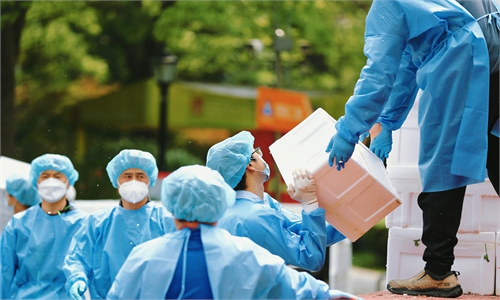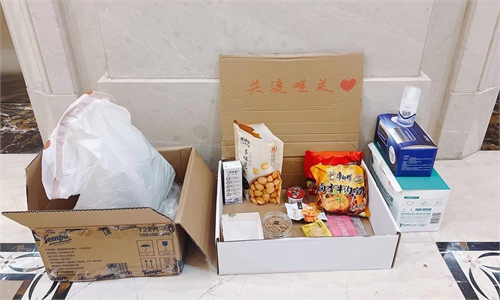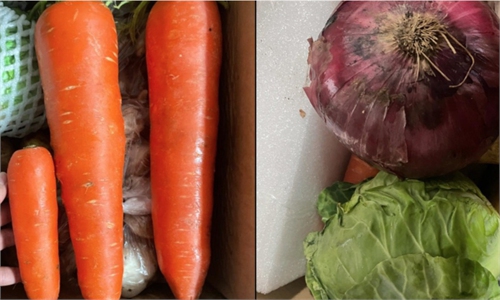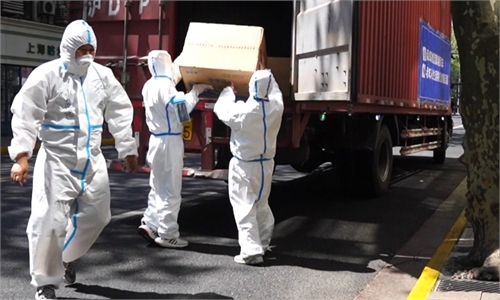Editor’s Note:
At present, the Shanghai epidemic prevention and control battle is at a critical stage. As an international trading and cultural hub, the sudden pause from the lockdown has drawn worldwide attention.
Meanwhile, people in Shanghai have shown their unique attitude toward this sudden challenge in their lives. The city offers examples of resilience and a determination to keep going at every turn.
The Global Times presents different stories unfolding during the current anti-epidemic battle in Shanghai, to showcase the city’s humanity, optimism and diversity. This is the third installment.
In a megacity where young workers rarely interact with their neighbors, dwellers in Shanghai have been talking to the neighbors more amid lockdown, partly due to the need to barter goods.
Bartering – a popular trading system since ancient times in which people exchange one item for another – is now being revived in Shanghai neighborhoods, both in low-end and high-grade communities. The metropolis of 26 million people was hit by intermittent shortages during the lockdown, which started on March 28 but has since been extended.
So bartering with each other and ad hoc collectives ordering directly from wholesale vendors have become innovative and indispensable solutions to relieve pressure as demand for food and essential goods remains huge.
Onions, ginger and garlic are among the most sought-after items in the unofficial trade between dwellers, while some more diversified needs are also being pursued, such as coffee and red wine.
Bartering with each other creates a new bond among people who rarely have a chance to communicate. Warmth and love from neighbors reveal another kind of charm in a city tagged as “a financial center hub,” making young people care more about community causes.
Carbonated drinks which can bring comfort to boring days of quarantine have become a precious commodity. Many joked that Coca-Cola has become a hard currency at the top of the food chain and can be exchanged for anything.
A group of photos that went viral online show how a man leaves Coca-Cola cans at the block gate free of charge for his neighbors, and after that his neighbors swap Coca-Cola for various daily supplies.
Stories about fun while bartering have been widely shared online, such as three eggs being exchanged for a piano lesson or three bags of cat food for a pair of limited-edition football shoes.
The warmth can be seen not only in the bartering, but also in the selfless dedication of community volunteers. The volunteers have become respected and highly relied-upon for the delivery of materials, everyday testing, and care for the vulnerable in the fight against the coronavirus.

Welcome for outsiders
The mutual care and support that residents have shown has been a benefit for tens of thousands of newcomers to Shanghai. Claudia Ruan, who settled down in Shanghai with her husband last September, shared with the Global Times her story about receiving help and love from neighbors during their quarantine at home.
Ruan’s residential community in Pudong New Area, built in the mid-1900s, houses nearly 900 residents, most of whom are Shanghai natives. When the residents started to exchange goods at the beginning of the city lockdown, Ruan was too shy to participate. “I don’t know them, nor do I speak the Shanghai dialect,” Ruan said.
But Ruan, who loves pickles, finally summoned the courage to ask in her community’s WeChat group whether any neighbors wanted to exchange pickles for cucumbers. She soon got replies from three neighbors. “I excitedly went downstairs with cucumbers and met the three neighbors,” Ruan recalled. To her surprise, they directly sent their pickles to her as gift, with one even additionally giving her yogurt.
Ruan said heartwarming things like this happen in the community almost every day. She said that last week, her downstairs neighbor gave her four bags of soy products such as tofu, and declined the apples and vegetables offered in return. “I used to think that Shanghainese people were indifferent and self-interested, and that they somewhat dislike us migrants,” she told the Global Times. “But now I’m ashamed of believing these stereotypes. They are so nice and kind.”
Posts of people infected with COVID-19 complaining about being alienated or isolated by neighbors are occasionally seen on social media, but fortunately these cases are seldom seen in Shanghai’s communities, local residents told the Global Times.
Ruan’s community reported three new infections last week. One of the patients, who is now being treated at a local Fangcang makeshift hospital, apologized in the WeChat group for bringing trouble and risks. “It’s not your fault. No stress. No one likes to get sick,” one neighbor soon replied. “Take care, everything will be fine,” wrote another.
Facing the unexpected challenge from the epidemic, it’s impressive to see how Shanghai residents have joined hands to get over the troubles with mutual help and encouragement, Ruan said. She mentioned one of her neighbors surnamed Chen, whose mother was infected with COVID-19 days ago and was the first case the community reported in this round of the outbreak. After Chen was transported to a nearby hotel for quarantine as a close contact, she voluntarily bought 50 packages of frozen seafood products online for residents in need in the community, especially the elderly living alone.
Chen explained that she bought the products to express thanks to her lovely neighbors, who, instead of blaming Chen’s mother for “bringing in the virus,” gave them love and comfort. “I’m so grateful to have you all in this hard time,” she wrote on WeChat.
The warmth of neighbors has also been experienced by expats living in Shanghai.
Andy Boreham, a veteran video journalist working in Shanghai, is the only expat in his block. But proficient Putonghua and Chinese reading have made him less worried amid the lockdown. He joined some bulk-buying WeChat groups and has bartered goods with neighbors in his compound, which has about 500 residents.
“I feel embarrassed to say this, but in around five years of living in this compound I haven’t had that much to do with my neighbors. Over the past few weeks I’ve made some new friends through all the WeChat groups we have set up, and everyone is really getting together to make sure we are all good. So many people have added my WeChat and asked if I needed anything, which is really heartwarming. I feel that this situation has definitely pulled us together, which we all know isn’t that common in inner city apartment living,” Andy told the Global Times.
He has also given food away to neighbors. He sent over a big bag of fresh vegetables – which are much treasured amid the lockdown – when he realized that his block had 12 young guys staying in one apartment. He was “a bit worried about whether or not they had enough supplies or need anything.”
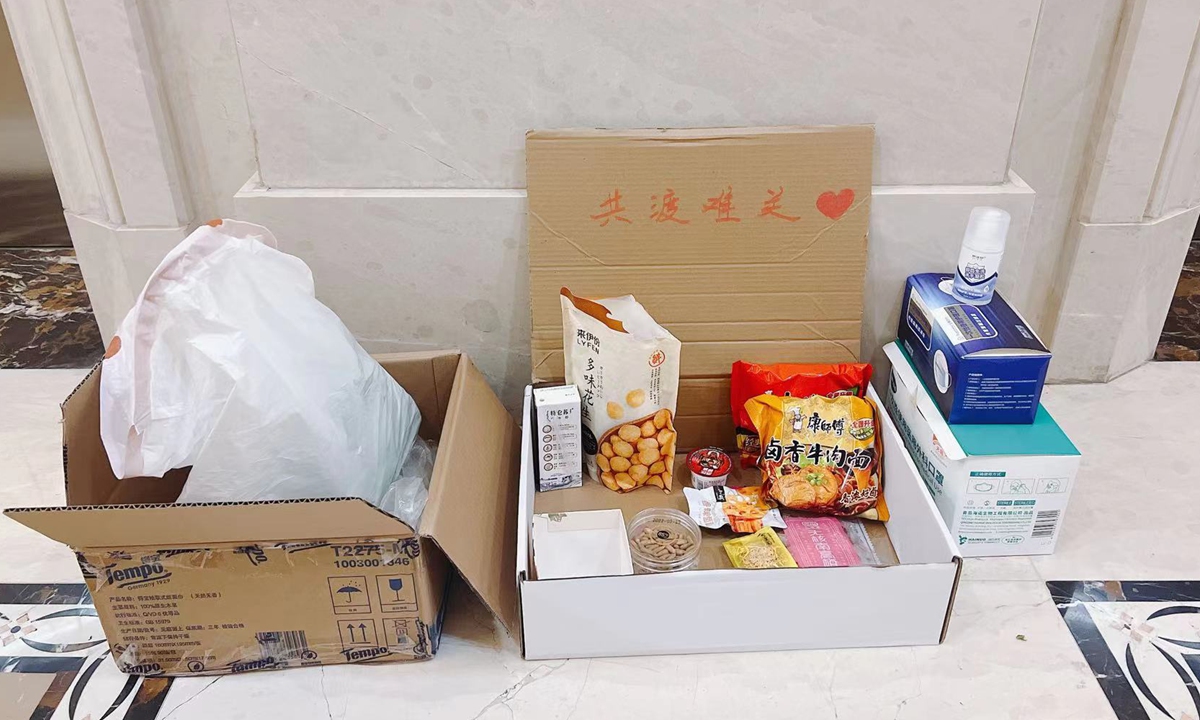
Voluntary efforts most valued
Since March 3, the number of registered volunteers in Shanghai has exceeded 360,000, with a total of 12.995 million hours of service, or 36.07 hours per person, according to data released by the China Volunteer Service Federation on April 25. More unregistered volunteers are still contributing quietly in the community.
Yolanda Guo, 29, who lives in Pudong district, has been volunteering in the community for more than 20 days, three days a week and up to five hours a day if assigned to assist in nucleic acid testing. "That would mean spending nearly five hours wrapped in a hazmat suit in the humid summer heat without eating or drinking," Guo told the Global Times.
“At the early stage of lockdown, many volunteers applied for our community. However, the neighborhood committee required volunteers from 25 to 40 years old, with two to be assigned to each building, mainly responsible for nucleic acid monitoring, transporting materials, maintaining order, and cleaning up garbage, which greatly supplemented the manpower shortage of the residents’ committee. Many volunteers from neighboring cities have come to assist and settle in our community, which makes us feel very grateful,” said Guo.
Guo is very concerned about the needs of the elderly, and she donated 100 bottles of water to give support to vulnerable.
Some communities in Shanghai have set up special volunteer teams to take care of the elderly, guaranteeing medicine for them, and cooking meals for elderly people who live alone.
Sometimes community volunteers work as hairdressers or bulk-buying group organizers, which require various skills.
Some say that such closely connected neighborhood ties are reminiscent of Shanghai’s historic alley life in the 1970s and 1980s, said one user on Sina Weibo. "At that time, neighbors helped each other and borrowed things frequently. These days, we have lived together for more than 10 years but did not know each other; the epidemic has unexpectedly brought us closer together."
At present, the Shanghai epidemic prevention and control battle is at a critical stage. As an international trading and cultural hub, the sudden pause from the lockdown has drawn worldwide attention.
Meanwhile, people in Shanghai have shown their unique attitude toward this sudden challenge in their lives. The city offers examples of resilience and a determination to keep going at every turn.
The Global Times presents different stories unfolding during the current anti-epidemic battle in Shanghai, to showcase the city’s humanity, optimism and diversity. This is the third installment.
In a megacity where young workers rarely interact with their neighbors, dwellers in Shanghai have been talking to the neighbors more amid lockdown, partly due to the need to barter goods.
Bartering – a popular trading system since ancient times in which people exchange one item for another – is now being revived in Shanghai neighborhoods, both in low-end and high-grade communities. The metropolis of 26 million people was hit by intermittent shortages during the lockdown, which started on March 28 but has since been extended.
So bartering with each other and ad hoc collectives ordering directly from wholesale vendors have become innovative and indispensable solutions to relieve pressure as demand for food and essential goods remains huge.
Onions, ginger and garlic are among the most sought-after items in the unofficial trade between dwellers, while some more diversified needs are also being pursued, such as coffee and red wine.
Bartering with each other creates a new bond among people who rarely have a chance to communicate. Warmth and love from neighbors reveal another kind of charm in a city tagged as “a financial center hub,” making young people care more about community causes.
Carbonated drinks which can bring comfort to boring days of quarantine have become a precious commodity. Many joked that Coca-Cola has become a hard currency at the top of the food chain and can be exchanged for anything.
A group of photos that went viral online show how a man leaves Coca-Cola cans at the block gate free of charge for his neighbors, and after that his neighbors swap Coca-Cola for various daily supplies.
Stories about fun while bartering have been widely shared online, such as three eggs being exchanged for a piano lesson or three bags of cat food for a pair of limited-edition football shoes.
The warmth can be seen not only in the bartering, but also in the selfless dedication of community volunteers. The volunteers have become respected and highly relied-upon for the delivery of materials, everyday testing, and care for the vulnerable in the fight against the coronavirus.

A community volunteer supports the delivery of goods for residents at the gate of the community. Photo: IC
Welcome for outsiders
The mutual care and support that residents have shown has been a benefit for tens of thousands of newcomers to Shanghai. Claudia Ruan, who settled down in Shanghai with her husband last September, shared with the Global Times her story about receiving help and love from neighbors during their quarantine at home.
Ruan’s residential community in Pudong New Area, built in the mid-1900s, houses nearly 900 residents, most of whom are Shanghai natives. When the residents started to exchange goods at the beginning of the city lockdown, Ruan was too shy to participate. “I don’t know them, nor do I speak the Shanghai dialect,” Ruan said.
But Ruan, who loves pickles, finally summoned the courage to ask in her community’s WeChat group whether any neighbors wanted to exchange pickles for cucumbers. She soon got replies from three neighbors. “I excitedly went downstairs with cucumbers and met the three neighbors,” Ruan recalled. To her surprise, they directly sent their pickles to her as gift, with one even additionally giving her yogurt.
Ruan said heartwarming things like this happen in the community almost every day. She said that last week, her downstairs neighbor gave her four bags of soy products such as tofu, and declined the apples and vegetables offered in return. “I used to think that Shanghainese people were indifferent and self-interested, and that they somewhat dislike us migrants,” she told the Global Times. “But now I’m ashamed of believing these stereotypes. They are so nice and kind.”
Posts of people infected with COVID-19 complaining about being alienated or isolated by neighbors are occasionally seen on social media, but fortunately these cases are seldom seen in Shanghai’s communities, local residents told the Global Times.
Ruan’s community reported three new infections last week. One of the patients, who is now being treated at a local Fangcang makeshift hospital, apologized in the WeChat group for bringing trouble and risks. “It’s not your fault. No stress. No one likes to get sick,” one neighbor soon replied. “Take care, everything will be fine,” wrote another.
Facing the unexpected challenge from the epidemic, it’s impressive to see how Shanghai residents have joined hands to get over the troubles with mutual help and encouragement, Ruan said. She mentioned one of her neighbors surnamed Chen, whose mother was infected with COVID-19 days ago and was the first case the community reported in this round of the outbreak. After Chen was transported to a nearby hotel for quarantine as a close contact, she voluntarily bought 50 packages of frozen seafood products online for residents in need in the community, especially the elderly living alone.
Chen explained that she bought the products to express thanks to her lovely neighbors, who, instead of blaming Chen’s mother for “bringing in the virus,” gave them love and comfort. “I’m so grateful to have you all in this hard time,” she wrote on WeChat.
The warmth of neighbors has also been experienced by expats living in Shanghai.
Andy Boreham, a veteran video journalist working in Shanghai, is the only expat in his block. But proficient Putonghua and Chinese reading have made him less worried amid the lockdown. He joined some bulk-buying WeChat groups and has bartered goods with neighbors in his compound, which has about 500 residents.
“I feel embarrassed to say this, but in around five years of living in this compound I haven’t had that much to do with my neighbors. Over the past few weeks I’ve made some new friends through all the WeChat groups we have set up, and everyone is really getting together to make sure we are all good. So many people have added my WeChat and asked if I needed anything, which is really heartwarming. I feel that this situation has definitely pulled us together, which we all know isn’t that common in inner city apartment living,” Andy told the Global Times.
He has also given food away to neighbors. He sent over a big bag of fresh vegetables – which are much treasured amid the lockdown – when he realized that his block had 12 young guys staying in one apartment. He was “a bit worried about whether or not they had enough supplies or need anything.”

Goods heaped up on the ground for residents who barter for their daily essentials. Photo: IC
Voluntary efforts most valued
Since March 3, the number of registered volunteers in Shanghai has exceeded 360,000, with a total of 12.995 million hours of service, or 36.07 hours per person, according to data released by the China Volunteer Service Federation on April 25. More unregistered volunteers are still contributing quietly in the community.
Yolanda Guo, 29, who lives in Pudong district, has been volunteering in the community for more than 20 days, three days a week and up to five hours a day if assigned to assist in nucleic acid testing. "That would mean spending nearly five hours wrapped in a hazmat suit in the humid summer heat without eating or drinking," Guo told the Global Times.
“At the early stage of lockdown, many volunteers applied for our community. However, the neighborhood committee required volunteers from 25 to 40 years old, with two to be assigned to each building, mainly responsible for nucleic acid monitoring, transporting materials, maintaining order, and cleaning up garbage, which greatly supplemented the manpower shortage of the residents’ committee. Many volunteers from neighboring cities have come to assist and settle in our community, which makes us feel very grateful,” said Guo.
Guo is very concerned about the needs of the elderly, and she donated 100 bottles of water to give support to vulnerable.
Some communities in Shanghai have set up special volunteer teams to take care of the elderly, guaranteeing medicine for them, and cooking meals for elderly people who live alone.
Sometimes community volunteers work as hairdressers or bulk-buying group organizers, which require various skills.
Some say that such closely connected neighborhood ties are reminiscent of Shanghai’s historic alley life in the 1970s and 1980s, said one user on Sina Weibo. "At that time, neighbors helped each other and borrowed things frequently. These days, we have lived together for more than 10 years but did not know each other; the epidemic has unexpectedly brought us closer together."


